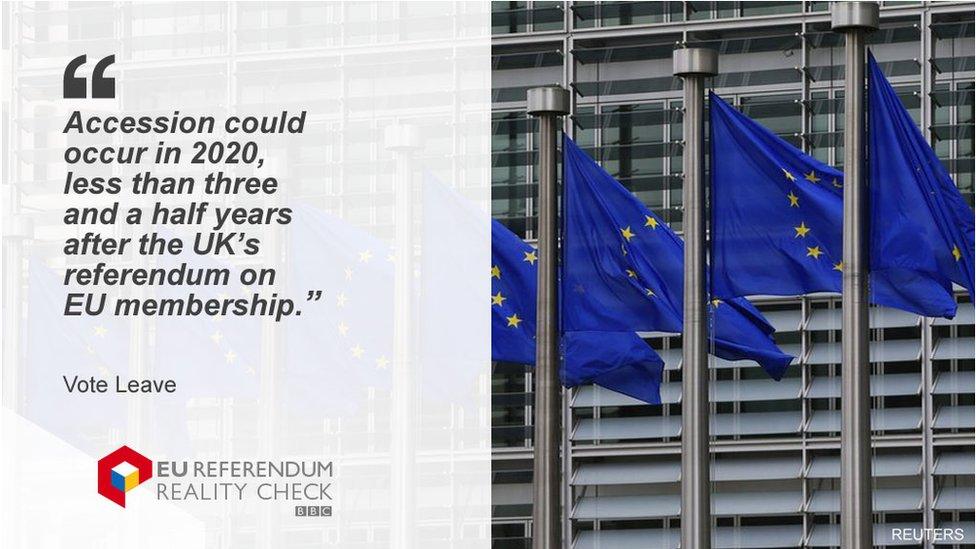Reality Check: Are 5 countries about to join the EU?
- Published

"Accession could occur in 2020, less than three and a half years after the UK's referendum on EU membership" - Vote Leave
The claim: Leave campaigners claim five countries: Albania, Macedonia, Montenegro, Serbia and Turkey will join the EU soon.
Reality Check verdict: The five countries are not going to join the EU any time soon and their admission to the EU - once they fulfil all the criteria - will be subject to a veto by the UK and all the other 27 existing EU countries.
Leave campaigners say Albania, Macedonia, Montenegro, Serbia and Turkey - with a combined population of 88 million - are all in line to gain EU membership in the coming years.
Michael Gove, who said on Friday, 20 May 2016, that the population of the UK would increase by between 2.6 million and 5 million by 2030, based his prediction , externalon the "future migration from the A5 on the assumption of their accession in 2020".
The Vote Leave campaign says that the EU enlargement is "an explicit policy of the European Commission and the British government".
It accuses the Prime Minister David Cameron of misleading the public over his support for Turkey's EU membership.
Penny Mordaunt MP, minister of state for the armed forces, who also campaigns for the UK to leave the EU, told Andrew Marr that Turkey would join the EU in the next eight years.
She said that the British people would not get to vote on Turkey joining, and denied that the British government had a veto over Turkey's membership.
'Not on the cards'
So, will the EU admit the five new countries in the next few years? Does the UK have a veto on it and would it be prepared to use it in this case?
European Commission President Jean Claude Juncker said in 2014, external: "Under my presidency of the commission, ongoing negotiations will continue … but no further enlargement will take place over the next five years". The mandate of the current commission's president expires on 1 November 2019.
David Cameron has indeed been a strong supporter of the Turkish membership of the EU in the past. In July 2010, on a visit to Turkey, David Cameron warned France and Germany not to shut Turkey "out of the club".
More recently, in October 2015, he said that the British government's policy on Turkey joining the EU had not changed, when asked about it in the House of Commons, external.
But he has changed his line more recently and today he told Robert Peston that Turkey joining the EU was not "remotely on the cards […] any time soon".
The UK, as well as all the other 27 EU countries, has a veto on any new country joining the EU.
A veto on the new countries joining has been in place case ever since the European integration began.
In 1963 French President Charles de Gaulle vetoed British membership of European Economic Community, the name for the EU at the time.
Preparatory work?
Once all the existing EU countries agree to admit a new member - and in the case of Turkey countries such as France, Cyprus and Greece have expressed serious reservations - this decision must then be approved by the European Parliament and be ratified by the parliaments of all existing EU states.
Only then can a new country join the EU.
There is no requirement in the UK to hold a referendum on a new country joining the EU - but it can do that if it chooses to. The UK has not held a referendum when the new countries joined in the past.
Lord Owen, a former foreign secretary, and leave campaigners said today that "the EU is continuing the preparatory work for Turkey at an accelerating pace".
The EU-Turkey deal from March 2016, on stemming the flow of refugees and migrants into the EU, included a confirmation by both sides that they would "re-energise the accession process".
This process is already under a considerable strain, only two months after the deal.
The EU promised short-term visa-free travel for Turkish citizens in the Schengen area, but it demanded that Turkey changes its anti-terror law in exchange.
Turkish president Recep Tayyip Erdogan said he would not do so and added: "We'll go our way, you go yours."
All would-be members take a long time to clear all the hurdles required to join the EU, because they are required to adopt and enforce all the current EU rules before they can be admitted to the bloc.
Turkey has taken a particularly long time so far.
It applied to join what was then the European Economic Community in 1987. It then waited 10 years to be declared "eligible" for accession talks, which finally started in October 2005.
In 10 years Turkey only managed to adopt the rules on one of the 35 policy areas: science and research. In most other areas it has not even made a start.
Montenegro started the policy area negotiations with the EU in 2012 and Serbia in December 2015. FYR Macedonia and Albania have not even started yet.
It took Croatia, Poland and Hungary 10 years to complete the process. At the current rate, none of the five countries would be ready to join for some time to come.



- Published17 March 2016

- Published22 February 2016
